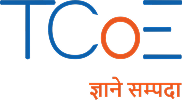Junior Engineer Drone(R & D) Course
The Junior Engineer Drone (R & D) Course is designed to nurture innovative minds eager to explore the science and engineering behind modern drone technology. This program provides a strong foundation in drone design, aerodynamics, electronics, and programming while focusing on developing creative problem-solving and research skills. Learners will gain hands-on experience in prototype development, flight testing, and performance analysis — key aspects of drone innovation.
- 540 Hours (2 hours/day x 6 days/week x 45 weeks) OR at your own pace
- Hindi, English
- Learn & Get Certified
- Basic & Intermediate
- Hands-On Training
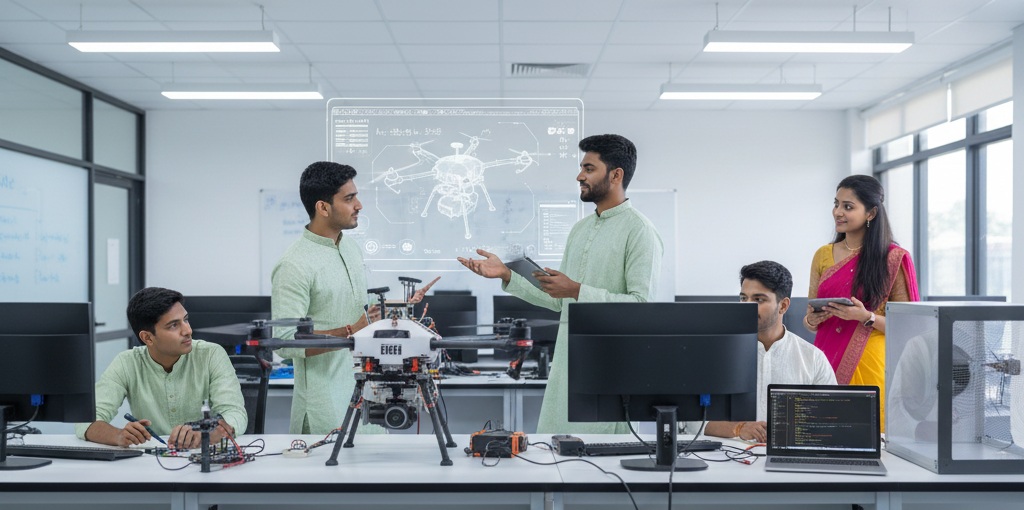
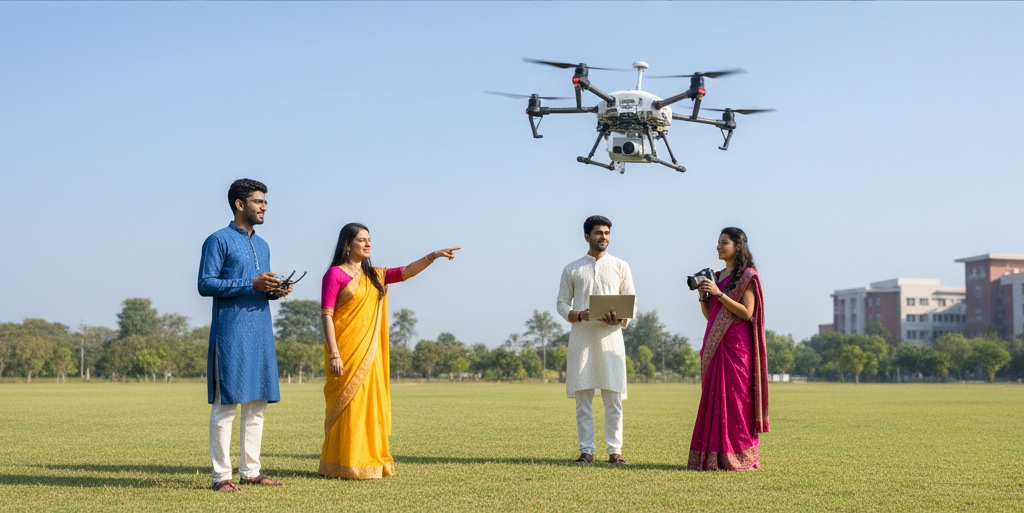
Online Course Fees
Offline Course Fees
About this course
Junior Engineer Drone (Research and Development) Course equips learners with the knowledge and skills to support the design, innovation, and improvement of drone technologies. The course covers drone mechanics, electronics, sensors, programming, prototyping, and testing methods, with a focus on research-driven problem-solving. Students will gain hands-on experience in developing and refining drone systems for applications in industries such as agriculture, defense, logistics, and environmental monitoring.
Understand drone design, prototyping, and testing processes while assisting in research and development of innovative UAV technologies and applications.
This course provides essential knowledge and practical training to build industry-relevant skills.
- Online Course Fees: ₹8000, ₹7500 (incl. GST) (Excluding tools & equipment cost)
- Offline Course Fees: ₹18000, ₹16500 (incl. GST) (Excluding tools & equipment cost)
- Certification: ESSCI
- Duration: 540 Hours (2 hours/day x 6 days/week x 45 weeks) OR at your own pace
What you'll learn
At the end of the program, the learner should have acquired the listed knowledge and skills:
- State the role and responsibilities of a Specialist
- Demonstrate the basic principles of Electronics and Drones
- Demonstrate the basic flying physics and motions of the drone using a simulator
- Demonstrate the process of inspecting different components of a Drone for testing
- Explain the process of testing a Drone for correct functioning
- Explain the process of manufacturing a prototype
- Explain the process of simulation using the software
- Explain the importance of following the quality and customer service standards
- Explain the importance of following inclusive practices for all genders
- Demonstrate the use of relevant health and safety equipment
Course Content
Why take this course?
This course is designed for learners who want to work on the design, development, and innovation side of drone technology. You will gain foundational R&D skills in drone systems, aerodynamics, propulsion, embedded electronics, sensors, flight controllers, and testing methodologies. The course emphasizes hands-on experimentation, prototyping, and performance evaluation, enabling you to contribute to product development and improvement. With the rapid growth of indigenous drone manufacturing and advanced UAV applications, this course prepares you for entry-level R&D roles and provides a strong pathway to advanced engineering careers in the unmanned aerial systems industry.
How to use online TCoE platform?
Tools and Equipment required
National Skill Development Mission
Module-1: Research in the field of Drones and it's components
1. Describe the size and scope of the electronics industry and its sub- sectors
2. List various types of Drones and their respective applications
3. State the role and responsibilities of a Drone Specialist
4. Discuss various opportunities in the Drone industry
5. State the organization’s policies on incentives, personnel management reporting structure etc.
Module2: Study of Block Diagram of a Drone
- Explain the functional Block Diagram of Drones. Describe functionality of each block and its importance with respect to the operations of the drone.
Module-3: Required Constituents/ Tools to assemble a Drone
1.Explain from block diagram to actual constituents that go into making of a Drone.
2. Describe in brief, significance, positioning of each constituent.
3. Explain the working of tools needed to assemble and make a drone.
4. Describe the functionality of each part of the Drone.
Module-4: Study of Drone Electronics/ Circuits
1. Overview of basic electronic components such as a resistor, capacitor, transistor, coil, motors, sensors etc.
2. Brushed and Brushless Motors
3. Factors in selection of motors in drones
4. Electronic Speed Control (ESC)
5. Calibrate and mount Electronic Speed Controllers (ESCs)
6. Explain Transmitters & Receivers and communication modules used in drones
7. Drone batteries and their types, pros and cons
8. Explain different sensors used in drones
9. Distinguish between different flight controllers and compare them
10. Explain Payloads in drones such as Cameras, Load Grippers etc.
11. Drone weight and payload weight
12. Explain payload weight distribution for a set of conditions
13. Payload based controller calibration
Module-5: Awareness of the software used
1. Overview of the various software
2. Overview of the simulation system
3. Overview of the Operating System
4. Overview of the hardware of the prototype
Module-6: Assembling, Testing, and Quality check of the Drone
1. On the basis of previous module knowledge gained in module 6 and 7 of electronics & aerodynamics(mechanical) of drones
2. Assemble different types of Drones from their components and sub-assemblies
3. To study the assembly procedures for at least 2 different types of drones
4. To study configurations and setting of drones to make them operational with desired functionality
5. To study the methods to carry out testing of drone sub-assemblies and also fully assembled drone with/without payload
6. Performing the necessary pre-dispatch Quality Checks on the Assembled / Manufactured drone.
Module-7: Types of Drones and their applications
1. State the different types of Drones and their applications
Module-8: Principles of Flying and Learning it with Drone Simulator
1. Understand basic principles of flying like Bernoulli’s Principle etc.
2. Apply principles of flight to Drones.
3. Understand Longitude/Latitude etc.
4. Take-off, Flight, Landing, Maneuvers, turns etc.
5. Multi-rotor configurations, airframe sizes and construction materials
6. Different propeller designs
7. Knowledge of the purpose of the different parts of the drones.
8. Acquire knowledge of thrust to weight ratio of a drone and how the propellers help in controlling the same
9. Apply concepts of Lift and drag for drone flight using a drone simulator
10. Understand concept of reverse torque acting on drones. Knowledge of 3-axis drone motions roll, pitch and yaw and impact of propellers on the motion
11. Knowing controlled roll and pitch angle and its bearing on the flight of the drone
12. Know sensor interfacing with the drone
13. Simulate the concept of Pitch, roll, yaw, thrust to weight ratio using Drone simulator
14. Simulate the concept of Hovering a drone, soft landing, controlled pitch and roll angles with a Drone Simulator
15. Use of Drones solving day-to-day problems
Module-9: Employability Skills
1. Discuss about Employability Skills in meeting the job requirements
2. Describe opportunities as an entrepreneur.
3. Describe ways of preparing for apprenticeship & Jobs appropriately.
Module 10: On-The-Job Training
1. Explain the fundamental concept of a Drone
2. Illustrate the preliminary tasks involve in the R & D of a Drone
3. Demonstrate how to perform preliminary checks on a Drone Simulation
4. Demonstrate how to carry out Testing of a Drone prior to deployment
5. Test functioning of the Drone prototype
6. Communicate product and service-related information to the customer
7. Interact and coordinate with supervisor and colleagues
8. Perform assigned work within timelines and with defined quality
9. Demonstrate how to maintain a healthy, safe and secure working environment
ENROLL TODAY & GET 30% OFF ON ALL COURSES
Your Future Can’t Wait, Enroll Now and Save 30% On All Courses.
Related Courses
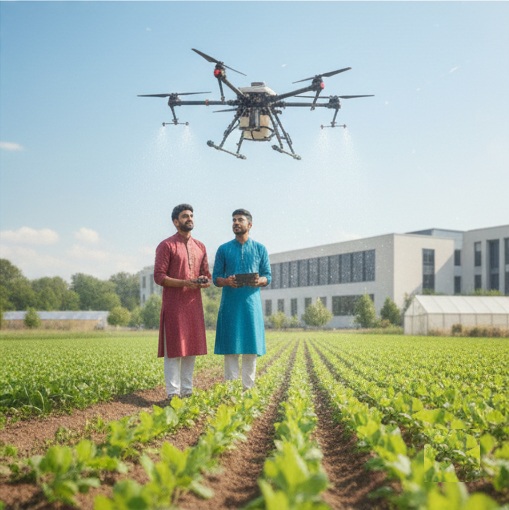
Agricultural Drone Engineer
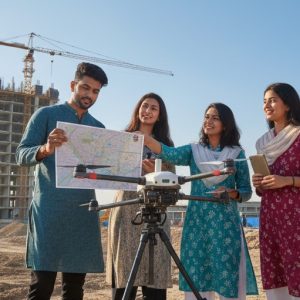
Terrain Mapping Drone Engineer

UAV Regulatory Affairs Consultant

Drone Engineer
See what our students have to say
With over a decade of experience, our mission is to produce future-ready skilled resources.


Drone Design and Prototyping
This module focuses on the creative and technical process of designing and building drone prototypes from the ground up. Learners will explore aerodynamics, frame design, material selection, and component integration to create efficient and stable drones. The topic also includes 3D modeling, simulation testing, and iterative improvements — essential skills in research and development. By mastering drone design and prototyping, students gain the ability to innovate, experiment with new concepts, and contribute to advancements in drone technology.
Job Opportunities
Here are some interesting job opportunities after completing the Junior Engineer Drone(R&D) course:
Drone R&D Engineer – Work on designing, developing, and testing next-generation drones for commercial or defense applications.
Aerospace Design Technician – Contribute to drone frame design, aerodynamics optimization, and component integration.
Prototype Development Specialist – Build and test experimental drone models for innovation projects.
Drone Software & Systems Engineer – Develop and optimize flight control algorithms, navigation systems, and automation features.
Test & Calibration Engineer – Conduct flight tests, analyze performance data, and refine drone prototypes.
Agricultural Drone Solutions Developer – Design drones specialized for precision agriculture, crop monitoring, and automated spraying.
Frequently asked questions
Do I need to know how to fly a drone before joining?
Not at all! The course starts with basic drone principles and gradually builds up to advanced design, programming, and testing skills.
What kind of practical experience will I gain?
You’ll work on real-world projects — from designing drone frames and integrating sensors to testing flight performance and analyzing data for R&D applications.
Is this course suitable for beginners or only for advanced learners?
It’s perfect for both! Beginners will learn the fundamentals, while advanced learners can dive deeper into innovation, aerodynamics, and system development.
What industries can I work in after completing this course?
Graduates can pursue opportunities in drone research labs, aerospace engineering, defense technology, agriculture automation, logistics, and drone manufacturing companies.
Will I learn to build my own drone?
Yes! One of the highlights of this course is hands-on prototyping — you’ll design, assemble, and test your own functional drone models.
